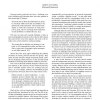Free Online Productivity Tools
i2Speak
i2Symbol
i2OCR
iTex2Img
iWeb2Print
iWeb2Shot
i2Type
iPdf2Split
iPdf2Merge
i2Bopomofo
i2Arabic
i2Style
i2Image
i2PDF
iLatex2Rtf
Sci2ools
107
click to vote
LICS
2006
IEEE
2006
IEEE
Provable Implementations of Security Protocols
for reasoning about abstract models of protocols. The work on informal methods attempts to discern common patterns in the extensive record of flawed protocols, and to formulate positive advice for avoiding each pattern [1, 2]. For example, Anderson and Needham propose an Explicitness Principle, that covers many classic errors: Robust security is about explicitness. A cryptographic protocol should make any necessary naming, typing and freshness information explicit in its messages; designers must also be explicit about their starting assumptions and goals, as well as any algorithm properties which could be used in an attack. [2] Much of the work on formal methods has depended on the powerful idea, introduced by Dolev and Yao [9], of idealizing cryptographic operations such as encryption and decryption as a symbolic algebra. After intense effort on symbolic reasoning, there are now several techniques [8, 7] for automatically proving properties of protocols represented within a symbolic,...
Related Content
| Added | 12 Jun 2010 |
| Updated | 12 Jun 2010 |
| Type | Conference |
| Year | 2006 |
| Where | LICS |
| Authors | Andrew D. Gordon |
Comments (0)

